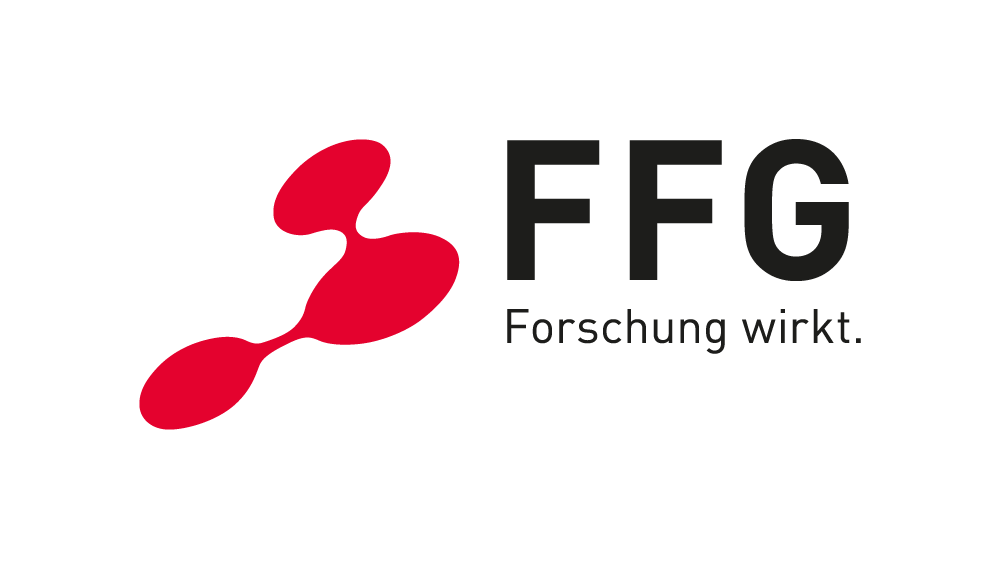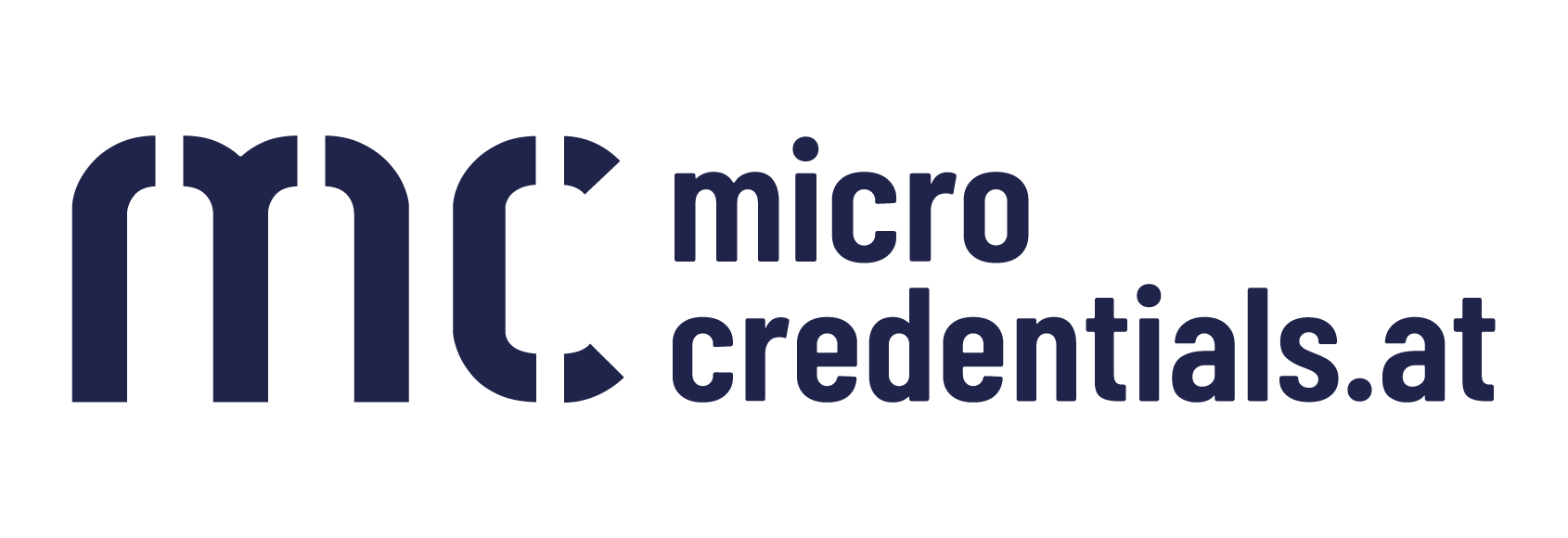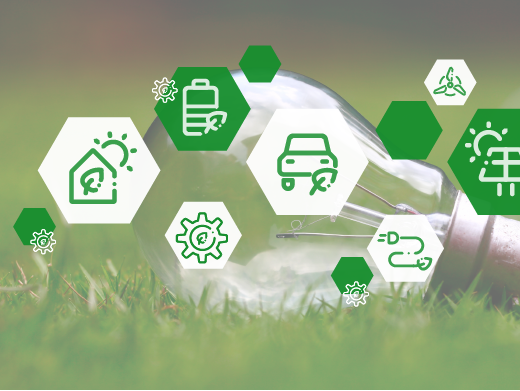Dekarbonisierung und Nachhaltigkeitsmanagement: Auf dem Weg zum Klimaneutralen Unternehmen
Kursstart: 5. Januar 2024
Dekarbonisierung und Nachhaltigkeitsmanagement: Auf dem Weg zum Klimaneutralen Unternehmen
Expert:innen der TU Graz
Dieser Kurs ist Teil eines Microcredentials auf microcredentials.at
Wissenschaftliche Einordnung:
Kursstart: 5. Januar 2024
Dekarbonisierung und Nachhaltigkeitsmanagement: Auf dem Weg zum Klimaneutralen Unternehmen
Expert:innen der TU Graz
Dieser Kurs ist Teil eines Microcredentials auf microcredentials.at
-
Umfang: 10 Lektionen
-
Aufwand: 2 Stunden/Woche
-
Teilnehmende aktuell: 458
-
Lizenz: CC BY 4.0
-
Kursstart: 5. Januar 2024
-
Kursende: -
-
Status aktuell: Laufender Kurs
-
Verfügbare Sprachen:
Details zum Kurs
Inhaltsübersicht
Allgemeine Informationen zum Kurs
Der Green Deal der EU mit dem Ziel der Klimaneutralität nimmt die Unternehmen nun endgültig in die Pflicht und erzeugt einen Handlungs- und Innovationsdruck in der Gesamtwirtschaft und speziell in der Industrie. Die aktuelle Situation in den Unternehmen lässt sich wie folgt beschreiben:
Viele Unternehmen haben schon einzelne Maßnahmen für mehr Nachhaltigkeit gesetzt, aber ihnen fehlt der Überblick.
Der große Teil der Unternehmen hat noch keine laufende Treibhausgasbilanzierung.
Bisher lag der Fokus auf Energie, nicht auf Klima (inkl. Aspekte wie grüne Lieferkette, etc.)
Klimaschutz wird aktuell oft in einer Abteilung angesiedelt, wird aber nicht abteilungsübergreifend gelebt.
Um die damit verbundenen „Change“-Herausforderungen als Chancen in Richtung Wettbewerbsvorteil wahrnehmen zu können, sind vor allem auch die Führungskräfte aufgefordert, grundlegendes Wissen in den für die Dekarbonisierung von Unternehmen relevanten Handlungsfeldern wie Energie & Grüne Produktion (Produkte und Services), nachhaltige Gebäude, betriebliche Mobilität anzueignen und sich speziell mit den Fragen des Nachhaltigkeits- und Changemanagement vertieft auseinanderzusetzen.
Kursinhalt
Die Teilnehmenden erwerben im MOOC einen Überblick zu relevanten Bereichen des Zero Carbon Managements in Unternehmen. In insgesamt 10 Lektionen werden nachfolgende Themen im Überblick und in die Materie einführend behandelt. Ausgehend von einer allgemeinen Übersichtslektion zum gesamten MOOC führen zwei der Lektionen in das Thema des Nachhaltigkeitsmanagements ein. Die beiden Lektionen des MOOC, die sich mit dem Thema Nachhaltigkeit beschäftigen, geben einen sehr guten Überblick über ausgewählte Aspekte des Nachhaltigkeitsmanagements:
Was heißt Nachhaltigkeit?
- Begriffsdefinition und Sustainable Development Goals
- SDG und Unternehmen
Was bedeutet/umfasst Nachhaltigkeitsmanagement?
- Abfall-, Energie- und Mobilitätsmanagement
- Umwelt- und Carbon Management
- Nachhaltigkeitsmanagement
Umweltmanagementsysteme und Nachhaltigkeitsberichterstattung
- Umweltmanagementsysteme: EMAS, ISO 14001
- Nachhaltigkeitsbericht
- Rechtliche Vorgaben und Standards: GRI, CSRS/ESRS
- Lieferkettenverantwortung
Was heißt Klimaneutralität für Unternehmen?
- Begriffsdefinition, rechtliche Rahmenbedingungen und ISO 14068
Treibhausgasbilanz
- Treibhausgase (THG), Greenhouse Gas Protocol (GHG)
- ISO 14064-1, ISO 14069
- Scope 1,2, und 3
- Upstream und Downstream-Emissionen
- Emissionsfaktoren, Datenbänke
- Methoden und Tools
Carbon Management
- Organisation, Ziele und Teilziele
- Backcasting und Roadmapping: Maßnahmen und Maßnahmenbündel, Wasserfalldiagramm
- Kontrolle, Audit/Evaluierung, Berichterstattung
- ISO 14068 und SBTi
Weitere Lektionen behandeln überblicksmäßig die Themenfelder:
- Energie & Green Production (4 Lektionen)
- Betriebliche Mobilität (2 Lektionen)
- Nachhaltige Gebäude (1 Lektion)
Lernziele
Nach Abschluss des MOOCs sind die Teilnehmenden in der Lage...
Handlungsfelder der Dekarbonisierung:
die wichtigsten Handlungsfelder der Dekarbonisierung sowie deren Herausforderungen zu beschreiben
Umwelt- und Nachhaltigkeitsmanagement:
erste Schritte zur Implementierung für ein modernes, an den SDG orientierten, EMAS- und ISO 14001-konformes Umwelt- und Nachhaltigkeitsmanagement zu setzen
Nachhaltigkeitsberichterstattung:
in ihrem Unternehmen die Grundvoraussetzungen für eine an der GRI orientierten europarechtskonforme Nachhaltigkeitsberichtserstattung zu schaffen
Treibhausgasbilanz:
die grundsätzliche Struktur einer GHG-Protocol-konformen Treibhausgasbilanz für ihr Unternehmen zu implementieren
Carbon Management:
die zentralen Tools für Carbon Management zu verstehen und im Unternehmen anzuwenden (Backcasting, Maßnahmenbündel-basierte Dekarbonisierungs-Roadmap, Setzung von Zwischen- und Teilzielen, THG-Budget)
Vorkenntnisse
Der MOOC „Dekarbonisierung & Nachhaltigkeitsmanagement: Der Weg zum klimaneutralen Unternehmen" richtet sich an diejenigen Personen im Unternehmen, die betriebliche Dekarbonisierungsprojekte analysieren, erläutern, initiieren oder steuern möchten und eine Kompetenz im Nachhaltigkeitsmanagement als Fach- oder Führungskraft anstreben, z.B. Projektleiter:innen, Qualitätsingenieur:innen, Betriebswirt:innen und vergleichbare Qualifikationen.
Speziell geeignet ist der Kurs für Fachkräfte aus den Branchen
- Industrie, F&E
- Beratungsdienstleistungen
- Handel und Logistik
- Energiewirtschaft
Kursablauf
Der MOOC gliedert sich in 10 Module (Lektionen). In Woche 1 werden Lektionen 1 und 2 freigeschaltet, in Woche 2 Lektionen 3, 4, 5; in Woche 3 Lektionen 6 und 7; in Woche 4 Lektionen 8, 9 und 10. Jede Lektion enthält Lehrvideos, begleitendes Online-Material, Interaktionen und ein Self-Assessment zur Überprüfung des Lernstoffes. Begleitet wird der Online-Kurs durch ein Forum, in dem sich Lehrende mit Lernenden oder Lernende untereinander austauschen. Synchrone Phasen sind hier nicht vorgesehen, damit Lernende im eigenen Lerntempo Inhalte erarbeiten können.
Zertifikat
Für die aktive Teilnahme am Kurs erfolgt bei Abschluss die Ausstellung eines automatisierten Zertifikats, welches Ihren Benutzernamen, den Kursnamen und die abgeschlossenen Lektionen beinhalten. Es wird darauf hingewiesen, dass es sich nur um eine Bestätigung handelt, die aussagt, dass die Benutzerin oder der Benutzer zumindest 75% der gestellten Selbstüberprüfungsfragen richtig beantwortet hat.
Lizenz
Dieses Werk ist lizenziert unter Creative Commons - 4.0 International (CC BY 4.0)
Zusätzliche Inhalte
Möglichkeit zur Teilnahme an einem Microcredential-Programm
Dieser Online-Kurs ist Teil eines Microcredential-Programms, angeboten in Kooperation mit der Organisationseinheit LifeLongLearning der TU Graz. Mehr Informationen dazu: https://microcredentials.at/dekarbonisierung-nachhaltigkeitsmanagement/
Kursleitung
Expert:innen der TU Graz
in alphabetischer Reihenfolge:
Ass.-Prof. Dipl.-Ing. Dr. phil. Günter Getzinger leitet die Science, Technology and Society Unit (STS) an der TU Graz. Er lehrt Umweltmanagement, nachhaltige Technikgestaltung, Technik und Ethik, sowie Technologiepolitik. In seiner Forschung beschäftigt er sich schwerpunktmäßig mit der Nachhaltigkeitstransition sozio-technischer Systeme, insbesondere des Mobilitäts- und des Energiesystems, mit Strategien zur Klimaneutralität, mit Technikfolgen-Abschätzung und mit Ethik in Wissenschaft und Technik.
Mehr lesen unter www.sts.tugraz.at
Univ.-Prof. Dipl.-Ing. Dr.techn. Franz Haas leitet das Institut für Fertigungstechnik (IFT) an der TU Graz und ist Dekan der Fakultät für Maschinenbau und Wirtschaftswissenschaften. Forschungsschwerpunkte sind die Präzisionsfertigung, der 3D-Druck von Metallen und Kunststoffen, die Industrierobotik sowie die Produktionsmethoden der E-Mobilität. In der smartfactory@tugraz schafft er Rahmenbedingungen für die Weiterentwicklung von Lösungen zur digitalen Transformation in der Fertigung und forscht an der energieeffizienten Werkzeugmaschine. Er ist davon überzeugt, dass Kreislaufwirtschaft nur durch radikale Innovation im Produktdesign und durch hochautomatisiertes „De-Assembling“ Realität werden kann.
Mehr lesen unter https://www.ift.tugraz.at
Univ.-Prof. Dr. Viktor Hacker leitet das Institut für Chemische Verfahrenstechnik und Umwelttechnik (CEET) an der TU Graz. Er lehrt zu den Themen erneuerbare Energiesysteme, Energiespeicherung, elektrochemische und elektrotechnische Verfahrenstechnik, Brennstoffzellen und Wasserstoff. Seine Forschungsschwerpunkte sind elektrochemische Energietechnologien und wasserstoffbasierte Systeme zur Realisierung nachhaltiger Mobilität, hocheffizienter Stromerzeugung und umweltfreundlicher Rohstoffversorgung für die Industrie.
Mehr lesen unter www.ceet.tugraz.at
Associate Prof. Dr. Mario Hirz ist stellvertretender Leiter des Instituts für Fahrzeugtechnik an der TU Graz. Er lehrt und forscht an der TU Graz, der Tongji Universität in Shanghai und ist Gastprofessor an Universitäten in Europa, Asien und in Nordamerika. Seine Forschungsthemen umfassen den nachhaltigen Personen- und Gütertransport, Technologien für die Mobilität der Zukunft, alternative Antriebe, mechatronische Systeme und computergestützte Entwicklung.
Mehr lesen unter http://www.ftg.tugraz.at/
Assoc.Prof. Dipl.-Ing. Dr. techn. Marlene Kienberger leitet die Arbeitsgruppe Bioraffinerie an der TU Graz. Sie lehrt Thermische Trennverfahren und Bioraffinerie. In ihrer Forschung beschäftigt sie sich vorwiegend mit der erweiterten stofflichen Nutzung erneuerbarer Ressource vor deren energetischer Nutzung. Ein wesentlicher Teil ihrer Forschung beschäftigt sich mit der Isolierung von Wertstoffen, die in Nebenströmen der biobasierten Industrie anfallen.
Mehr lesen unter www.icvt.tugraz.at
Univ.-Prof. DI Dr.techn. Thomas Kienberger ist seit 2014 Professor und Vorstand des Lehrstuhls für Energieverbundtechnik an der Montanuniversität Leoben. Er ist Experte für integrierte Energiesysteme der öffentlichen Energieversorgung und der Industrie. Schwerpunkte seiner Forschung und Lehre sind interdisziplinäre, systemische Ansätze zur Integration erneuerbarer Energie und zur Steigerung der gesamtsystemischen Energieeffizienz. Seit 2018 ist Thomas Kienberger Mitglied der Lenkungsgruppe der Vorzeigeregion New Energy For Industry – NEFI und Leiter des NEFI_lab. Er ist Innovator und Netzwerker in der Energiecommunity in Österreich und darüber hinaus.
Mehr lesen unter https://www.evt-unileoben.at
Dipl.-Ing. Dr.techn. Helmuth Kreiner ist stellvertretender Leiter der Arbeitsgruppe Nachhaltiges Bauen am Institut für Tragwerksentwurf an der Technischen Universität Graz. Wissenschaftlich widmet sich Herr Kreiner schwerpunktmäßig der systemischen Bewertung und Optimierung der Nachhaltigkeit von Bauprodukten, Gebäuden und deren zugehörigen Prozessen. Seit 2019 koordiniert er für die TU Graz im Rahmen einer nationalen Forschungskooperation österreichischer Universitäten (Projekt „UniNEtZ“ - Universitäten und Nachhaltige Entwicklungsziele) das Agenda 2030 Target SDG 11 (Nachhaltige Städte und Gemeinden) bei der Entwicklung eines Optionenberichts für die österreichische Bundesregierung.
Mehr lesen unter https://agnhb.tugraz.at
Univ.-Prof. Dipl.-Ing. Dr. techn. Alexander Passer, MSc. ist Professor für Nachhaltigen Bauens an der TU Graz. Er leitet dazu eine Arbeitsgruppe sowie den Universitätslehrgang „Nachhaltiges Bauen“. Seine Forschungsschwerpunkte sind die Operationalisierung der Nachhaltigkeit im Bauwesen, Life Cycle Assessment (LCA), Life Cycle Cost Analysis (LCCA), Multikriterielle Entscheidungsmodelle (MCDM) sowie Building Information Modeling (BIM). Darüber hinaus ist er im Vorstand des Climate Change Centre Austria (CCCA), dem Klimaforschungsnetzwerk Österreich.
Mehr lesen unter https://agnhb.tugraz.at
Partner:innen
Dieser Kurs wird aus Mitteln der FFG gefördert (FFG Projektnr. 893605) www.ffg.at
Das Projekt „DeCarb“ ist ein Innovationscamp M im Rahmen der Qualifizierungsoffensive des Bundesministeriums für Arbeit und Wirtschaft.


-

Technische Universität Graz
-

microcredentials.at
